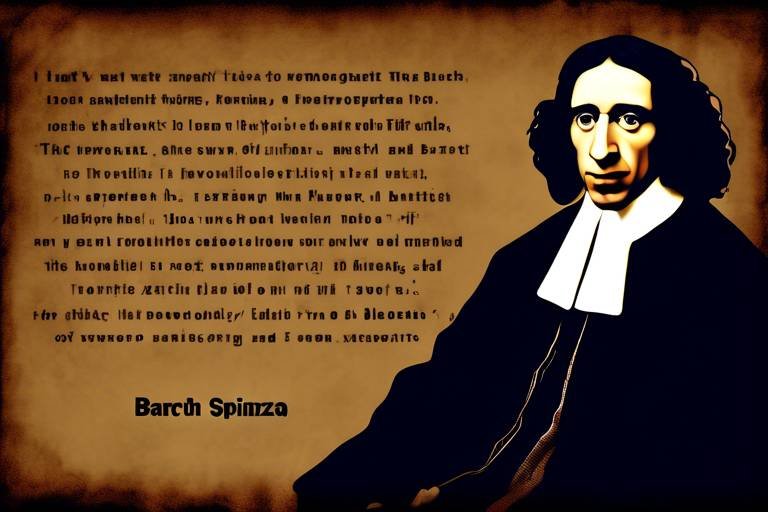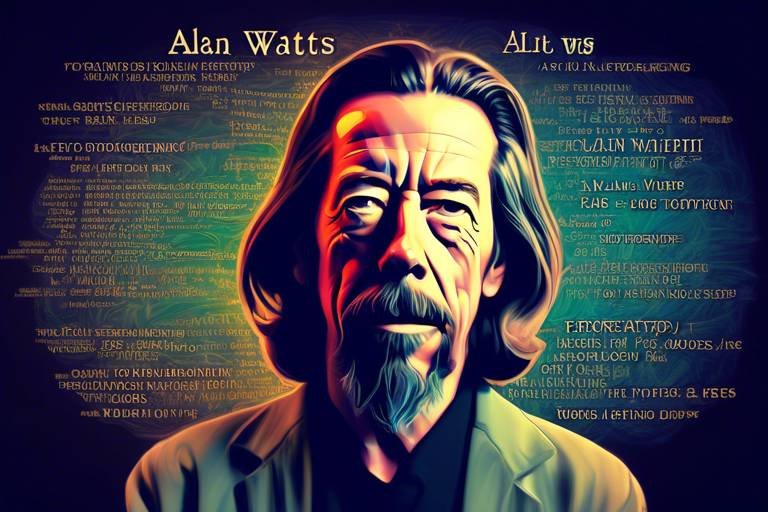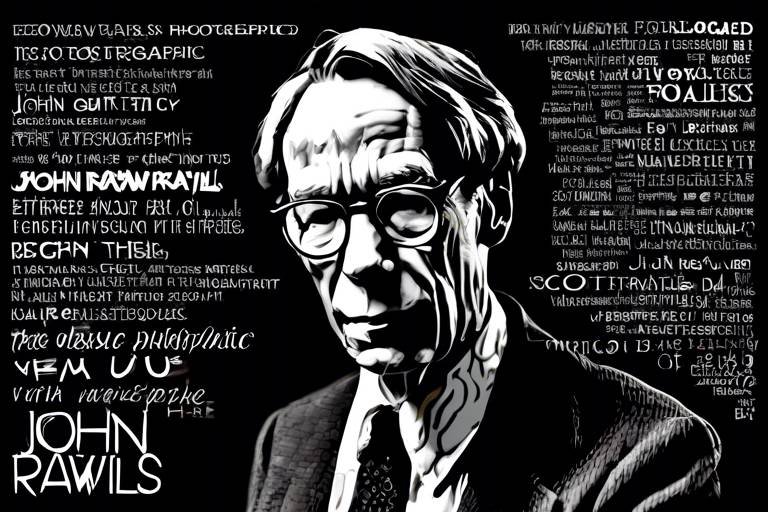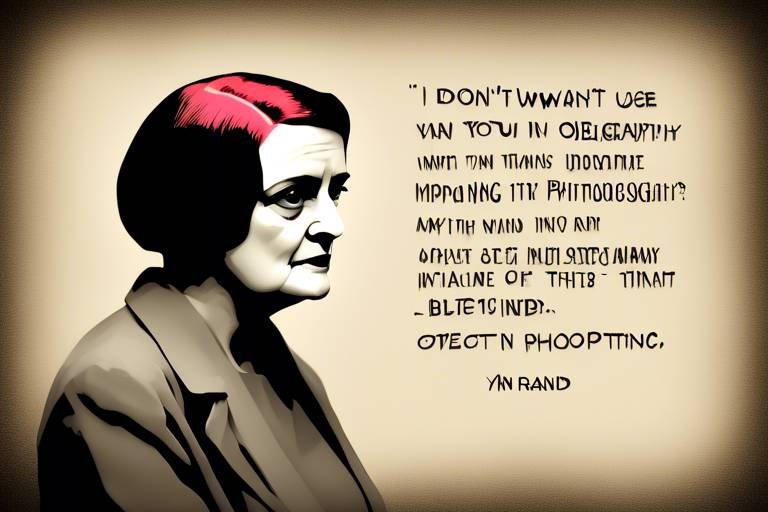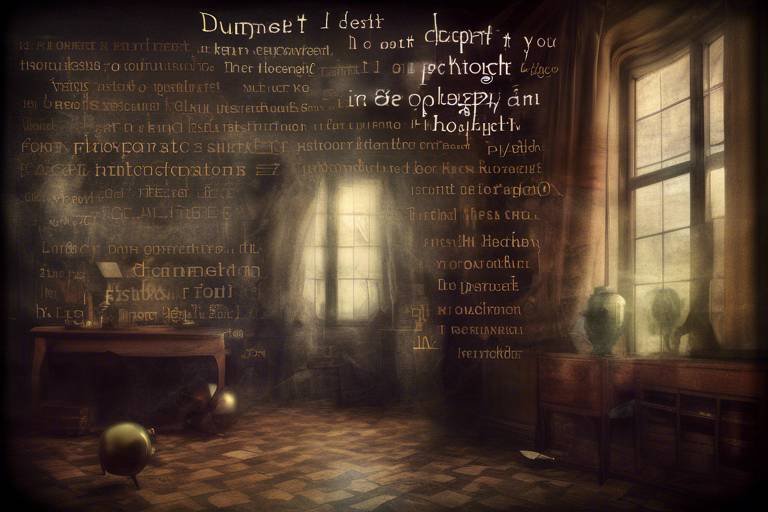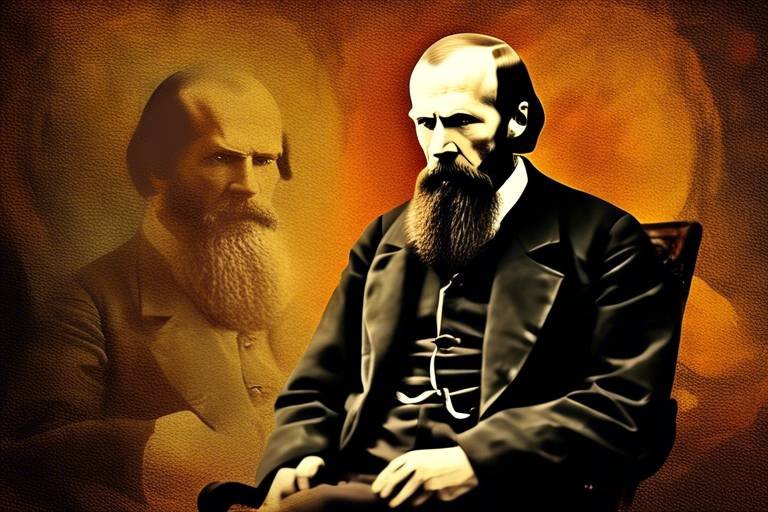The Revolutionary Thought of Baruch Spinoza and Its Impact
Baruch Spinoza, a 17th-century Dutch philosopher, is often regarded as one of the most influential thinkers in Western philosophy. His revolutionary ideas have transcended time, continuously sparking debate in fields like ethics, politics, and religion. Spinoza's work is not just a relic of the past; it serves as a lens through which we can examine contemporary issues, making his philosophy both relevant and essential in today’s world. But what makes Spinoza's thought so revolutionary? Let’s dive deeper into his ideas and their profound impact.
At the heart of Spinoza's philosophy lies the concept of substance. He proposed that there is a single, infinite substance that constitutes the essence of everything in the universe. This idea stands in stark contrast to the traditional dualistic views that separate mind and body or spirit and matter. Instead, Spinoza argued that everything is interconnected, forming a unified whole. This perspective not only reshaped metaphysical discussions in Western philosophy but also challenged the very foundations of how we understand existence itself. Imagine viewing the universe as a vast ocean where every wave, every ripple, is part of the same body of water. This analogy encapsulates Spinoza's vision of a singular substance that encompasses all reality.
In his seminal work, Ethics, Spinoza presents a groundbreaking understanding of good and evil. Rather than viewing these concepts as absolute, he argues that they are relative to individual perspectives. This insight has profound implications for moral philosophy and human behavior. Think about it: if good and evil are subjective, then our moral judgments are influenced by our unique experiences and contexts. This perspective invites us to reconsider how we approach ethical dilemmas, urging us to adopt a more empathetic and understanding stance towards others.
Spinoza places a strong emphasis on the role of reason in ethical decision-making. He posits that true happiness and fulfillment arise from rational understanding and knowledge. In a world where emotions often cloud our judgment, Spinoza's insistence on reason as a guiding principle is both refreshing and necessary. It aligns with contemporary ethical theories that prioritize rationalism and human well-being. By embracing reason, we can navigate the complexities of moral choices more effectively, leading to a more harmonious society.
One of Spinoza's remarkable contributions is his exploration of emotions. He argues that emotions can be understood and managed through reason, paving the way for modern psychological approaches to emotional intelligence. Imagine being able to dissect your feelings with the same clarity as a scientist analyzing data. This ability to rationally engage with our emotions not only enhances self-regulation but also fosters healthier relationships. In today’s fast-paced world, where emotional turmoil is common, Spinoza's insights offer a pathway to greater emotional resilience.
Spinoza's views on freedom present a thought-provoking challenge to the conventional notion of free will. He suggests that true freedom lies in understanding the deterministic nature of reality. This perspective leads to a rich debate about the nature of human agency and responsibility. Are we merely puppets of fate, or do we possess the power to shape our destinies? Spinoza invites us to explore this question, encouraging a deeper understanding of our place in the universe.
When it comes to politics, Spinoza was a staunch advocate for democracy and freedom of expression. He believed that governance should be rooted in collective rationality, emphasizing the importance of public discourse in shaping society. His ideas remain incredibly relevant today, especially in discussions about political theory and civil rights. In an age where misinformation and polarization abound, Spinoza's call for rational dialogue and democratic principles serves as a guiding light for contemporary political discourse.
Spinoza’s ideas have left an indelible mark on modern philosophical discourse. Influencing thinkers like Hegel, Nietzsche, and Deleuze, his work has contributed to the development of existentialism, rationalism, and postmodernism. His philosophical legacy is a testament to the power of ideas to shape the course of human thought. As we navigate the complexities of modern life, Spinoza's insights continue to resonate, reminding us of the interconnectedness of all things.
Furthermore, Spinoza's philosophy laid the groundwork for Enlightenment ideals, promoting reason, individualism, and secularism. These principles have become cornerstones of modern democratic societies and intellectual movements. His vision of a rational and just society inspires ongoing discussions about the role of reason in governance and personal freedom.
Today, Spinoza's thoughts echo in contemporary discussions on ethics, politics, and spirituality. His ideas challenge us to confront current societal challenges and philosophical inquiries with a fresh perspective. By engaging with Spinoza's philosophy, we can cultivate a deeper understanding of our world and our place within it. His work is not merely an academic pursuit; it is a call to action, urging us to think critically and empathetically about the issues that shape our lives.
- Who was Baruch Spinoza?
Baruch Spinoza was a 17th-century Dutch philosopher known for his contributions to ethics, politics, and metaphysics. - What is Spinoza's philosophy of substance?
Spinoza proposed that there is a single, infinite substance that encompasses everything, challenging dualistic views. - How did Spinoza view good and evil?
He argued that good and evil are relative concepts, shaped by individual perspectives. - What is the significance of reason in Spinoza's ethics?
Spinoza believed that reason is essential for making ethical decisions and achieving true happiness. - How do Spinoza's ideas influence modern thought?
His philosophy has impacted various fields, including existentialism, rationalism, and political theory.
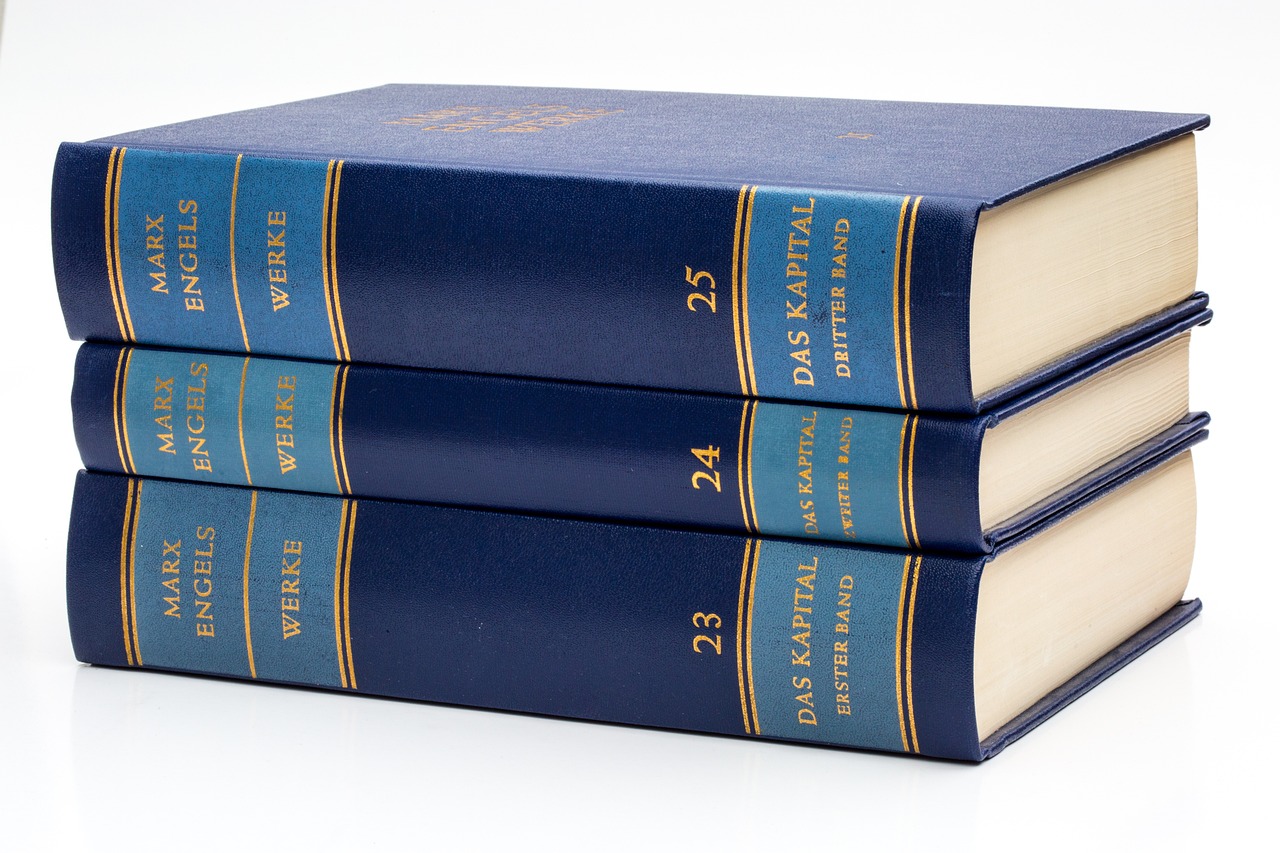
Spinoza's Philosophy of Substance
Baruch Spinoza's philosophy is anchored in his radical concept of substance, which he defines as a single, infinite entity that constitutes the essence of everything that exists. In a world where dualistic views—such as the separation of mind and body or God and nature—have dominated philosophical thought, Spinoza boldly challenges these notions. He posits that there is only one substance, which he famously refers to as Deus sive Natura (God or Nature). This idea not only reshapes metaphysical discussions but also invites us to reconsider our understanding of existence itself.
To grasp the depth of Spinoza's thought, we must explore how he articulates the nature of this substance. He argues that everything that happens is a manifestation of this single substance, which is characterized by its infinite attributes. For Spinoza, attributes are the essential qualities of substance, with thought and extension being the most prominent. This leads to a profound realization: everything in the universe, including human beings, is interconnected and part of a greater whole.
Spinoza's rejection of dualism has significant implications. By asserting that there is no distinction between the creator and the creation, he effectively dismantles the traditional view of a personal, interventionist God. Instead, he offers a vision of a deterministic universe where everything follows the laws of nature. This perspective compels us to rethink our relationship with the divine and the natural world, suggesting that understanding the universe's laws is akin to understanding God itself.
Moreover, Spinoza's philosophy of substance invites us to reflect on our own existence. If we are all expressions of the same substance, then our individual identities are interconnected. This realization fosters a sense of unity and encourages a more compassionate approach to ethics and politics. In a way, Spinoza's vision becomes a call to recognize our shared humanity and the importance of collective well-being.
In summary, Spinoza's philosophy of substance not only challenges prevailing metaphysical views but also lays the groundwork for a more integrated understanding of existence. His ideas resonate through the ages, influencing various fields such as ethics, politics, and even science. As we delve deeper into his work, we can appreciate the revolutionary nature of his thought and its lasting impact on modern philosophy.

Ethics and the Nature of Good
When we dive into Spinoza's Ethics, we encounter a revolutionary perspective on the concepts of good and evil. Unlike traditional views that often cast these ideas in a binary light, Spinoza argues that they are not absolute but rather relative to individual perspectives. This radical notion invites us to rethink our moral frameworks and understand that what may be deemed "good" for one person could be seen as "evil" by another. Imagine a world where moral judgments are not set in stone but are fluid, shaped by context and personal experience. This perspective has profound implications for how we view human behavior and ethical decision-making.
Spinoza challenges us to consider the roots of our ethical beliefs. He suggests that our understanding of good is often influenced by our emotions, desires, and societal norms. This leads to a critical question: if our perceptions of good and evil are so subjective, how can we establish a common moral ground? Spinoza would argue that the answer lies in the power of reason. He posits that through rational thought, individuals can arrive at a more universal understanding of ethics, one that transcends personal bias and societal conditioning.
In Spinoza's view, the ultimate good is tied to the pursuit of knowledge and the understanding of the universe. He believed that true happiness comes from aligning our desires with the greater order of nature. This is where his philosophy intersects with modern ethical theories that emphasize rationalism and human well-being. By fostering a rational understanding of our emotions and desires, we can cultivate a sense of fulfillment that is not merely based on fleeting pleasures but on a deeper connection to the world around us.
Moreover, Spinoza's exploration of emotions is particularly fascinating. He argues that emotions should not be seen as obstacles to rational thought but as integral components of our human experience. By understanding our emotions through the lens of reason, we can learn to manage them effectively. This concept has paved the way for contemporary approaches to emotional intelligence and self-regulation, highlighting the importance of being aware of our emotional states and how they influence our ethical choices.
Ultimately, Spinoza's philosophy invites us to reflect on the nature of human freedom and its relationship with ethics. He challenges the conventional notion of free will, suggesting that true freedom is achieved through the understanding of the deterministic nature of reality. This perspective encourages us to embrace our circumstances and make conscious choices that align with our rational understanding of what is good. In doing so, we not only elevate our own ethical standards but also contribute to a more harmonious society.
- What is Spinoza's view on good and evil? Spinoza believes that good and evil are relative concepts shaped by individual perspectives rather than absolute truths.
- How does reason play a role in ethics according to Spinoza? Reason is essential in Spinoza's ethical framework as it enables individuals to understand their emotions and desires, leading to true happiness.
- What is the significance of emotions in Spinoza's philosophy? Emotions are seen as integral to human experience, and understanding them through reason can enhance our ethical decision-making.
- How does Spinoza's view on freedom differ from traditional notions of free will? Spinoza argues that true freedom comes from understanding the deterministic nature of reality, rather than the ability to make arbitrary choices.

Ethics,
Baruch Spinoza's exploration of ethics in his seminal work, Ethics, offers a refreshing perspective that challenges conventional notions of morality. Unlike many philosophers who categorized actions as strictly good or evil, Spinoza proposed that these concepts are not absolute but rather relative to individual experiences and societal contexts. This radical idea invites us to reconsider how we perceive morality in our daily lives. Imagine if we viewed ethical dilemmas not as black-and-white choices but as a spectrum of possibilities influenced by our unique circumstances. This shift in perspective can lead to a more compassionate understanding of human behavior.
At the heart of Spinoza's ethical framework is the belief that reason plays a pivotal role in guiding our actions. He argues that when individuals engage in rational thought, they are better equipped to make decisions that lead to genuine happiness and fulfillment. This emphasis on rationality is particularly relevant today as we navigate a world filled with complex moral questions. For instance, consider the ethical implications of technology in our lives—how often do we rely on emotional reactions rather than reasoned analysis when faced with ethical dilemmas? Spinoza encourages us to embrace a more thoughtful approach.
Spinoza's assertion that reason is central to ethical decision-making is a call to arms for modern thinkers. He believed that true happiness stems from understanding the world through a rational lens, which can profoundly influence contemporary ethical theories. In a society that often prioritizes emotional responses over logical reasoning, Spinoza's philosophy serves as a reminder that rational understanding can lead to more equitable and just outcomes. By promoting reason as the foundation of ethics, he paved the way for a more enlightened approach to moral philosophy.
Interestingly, Spinoza did not dismiss the role of emotions; rather, he sought to understand them through the lens of reason. He posited that our emotions could be managed and understood, allowing individuals to achieve a greater sense of self-regulation and emotional intelligence. This insight resonates with modern psychology, where emotional intelligence is recognized as a key factor in personal and professional success. By learning to navigate our emotions through rational thought, we can cultivate healthier relationships and make better decisions.
One of the most provocative aspects of Spinoza's ethical philosophy is his perspective on freedom. He challenges the traditional notion of free will, arguing that true freedom lies in understanding the deterministic nature of reality. This view raises essential questions about accountability and moral responsibility. If our actions are determined by a complex web of causes and effects, how do we reconcile this with our understanding of ethical behavior? Spinoza's ideas continue to spark debate in philosophical and scientific circles, urging us to reflect on the nature of our choices.
In summary, Spinoza's contributions to ethics offer a profound and nuanced understanding of morality that remains relevant in today's world. His emphasis on reason, the management of emotions, and the exploration of freedom challenges us to rethink our ethical frameworks. As we grapple with complex moral issues, Spinoza's insights provide a valuable lens through which to examine our beliefs and behaviors.
- What is Spinoza's main argument in his ethical philosophy?
Spinoza argues that good and evil are relative concepts influenced by individual perspectives, and that reason is essential for ethical decision-making. - How does Spinoza view emotions in relation to ethics?
He believes emotions can be understood and managed through reason, which can lead to better ethical outcomes. - What does Spinoza mean by human freedom?
He suggests that true freedom is found in understanding the deterministic nature of reality, rather than the traditional concept of free will.

Spinoza presents a unique understanding of good and evil, arguing that these concepts are relative to individual perspectives, which has significant implications for moral philosophy and human behavior.
This article explores Baruch Spinoza's philosophical contributions, examining his views on ethics, politics, and religion, and how they have influenced modern thought and contemporary debates in various fields.
Spinoza's concept of substance is foundational to his philosophy, proposing a single, infinite substance that encompasses everything, challenging traditional dualistic views and reshaping metaphysical discussions in Western philosophy.
In his work Ethics, Spinoza presents a unique understanding of good and evil, arguing that these concepts are relative to individual perspectives, which has significant implications for moral philosophy and human behavior. He asserts that what one person may deem as "good" could be viewed as "evil" by another, depending on their personal experiences, beliefs, and emotional states. This radical perspective invites us to reconsider the foundations of our moral judgments and encourages a more empathetic understanding of others' viewpoints.
Spinoza emphasizes the importance of reason in ethical decision-making, suggesting that rational understanding leads to true happiness and fulfillment, thereby influencing contemporary ethical theories focused on rationalism and human well-being.
Spinoza's exploration of emotions reveals how they can be understood and managed through reason, paving the way for modern psychological approaches to emotional intelligence and self-regulation.
Spinoza's views on freedom challenge the notion of free will, suggesting that true freedom lies in understanding the deterministic nature of reality, a perspective that continues to provoke debate in philosophy and science.
Spinoza's political thought advocates for democracy and freedom of expression, emphasizing the importance of collective rationality in governance, which remains relevant in discussions about political theory and civil rights today.
Spinoza's ideas have significantly shaped modern philosophical discourse, influencing thinkers such as Hegel, Nietzsche, and Deleuze, and contributing to the development of existentialism, rationalism, and postmodernism.
His work laid the groundwork for Enlightenment ideals, promoting reason, individualism, and secularism, which have become cornerstones of modern democratic societies and intellectual movements.
Spinoza's thoughts resonate in contemporary discussions on ethics, politics, and spirituality, highlighting the enduring nature of his ideas and their applicability to current societal challenges and philosophical inquiries.
- What is Spinoza's view on good and evil?
Spinoza believes that good and evil are not absolute but rather relative to individual perspectives, shaped by personal experiences and emotions. - How does Spinoza's philosophy influence modern ethics?
His emphasis on reason and the relativity of moral judgments has paved the way for contemporary ethical theories that prioritize rationalism and understanding in moral decision-making. - What implications does Spinoza's thought have for human behavior?
By understanding that our perceptions of good and evil are subjective, we can foster empathy and tolerance in our interactions with others, leading to more harmonious social dynamics.

The Role of Reason in Ethics
When we dive into the philosophical ocean of Baruch Spinoza, we find ourselves swimming alongside the currents of reason and ethics. Spinoza passionately argued that reason is not just a tool but the very foundation of ethical living. Imagine reason as a lighthouse guiding a ship through the fog of confusion; without it, we are lost at sea, tossed about by the waves of emotion and impulse. For Spinoza, true happiness and fulfillment arise when we allow reason to illuminate our choices, steering us away from destructive paths.
Spinoza's perspective is a game-changer, especially when we consider how often people make decisions based on fleeting feelings rather than rational thought. He posits that emotions can cloud our judgment, leading us to act against our own best interests. It’s like trying to navigate a maze blindfolded—without the clarity that reason provides, we are likely to get stuck in loops of regret and confusion. This insight has profound implications for moral philosophy, suggesting that our understanding of good and evil should be rooted in reasoned analysis rather than mere subjective feelings.
In Spinoza's view, the ethical life is not about rigid rules or dogmas but about understanding the interconnectedness of all things through reason. He believed that when we grasp the underlying principles of our existence, we can better navigate our relationships and decisions. This approach encourages a more compassionate and empathetic society, as individuals recognize that their actions have repercussions beyond themselves. Spinoza's emphasis on rational understanding over emotional reaction has paved the way for contemporary ethical theories that prioritize human well-being and rationalism.
To illustrate Spinoza's ideas further, let’s consider a simple table that contrasts emotional decision-making with reasoned decision-making:
| Aspect | Emotional Decision-Making | Reasoned Decision-Making |
|---|---|---|
| Basis | Subjective feelings | Logical analysis |
| Outcome | Often impulsive | More consistent and beneficial |
| Understanding | Limited perspective | Broader understanding of consequences |
| Long-term effects | Potential regret | Informed choices leading to fulfillment |
Spinoza’s ideas resonate with modern discussions on emotional intelligence as well. Today, we recognize that managing our emotions through reason is essential for personal growth and ethical living. This blend of emotional awareness and rational thought helps us respond to situations with clarity rather than knee-jerk reactions. By embracing Spinoza's philosophy, we can cultivate a deeper understanding of ourselves and our interactions with others, ultimately leading to a more harmonious society.
In essence, Spinoza invites us to engage in a continual process of self-reflection and rational inquiry. He challenges us to ask: How can we apply reason to our ethical dilemmas? What role does understanding play in our moral choices? By doing so, we not only honor Spinoza’s legacy but also empower ourselves to navigate the complexities of life with wisdom and compassion.
- What is Spinoza's view on emotions? Spinoza believed that emotions should be understood and managed through reason, as this leads to better ethical decisions.
- How does reason influence happiness according to Spinoza? He argued that true happiness comes from rational understanding, which helps individuals make informed choices that align with their well-being.
- Why is Spinoza's philosophy relevant today? His ideas on reason and ethics resonate in contemporary discussions about emotional intelligence and rational decision-making in personal and societal contexts.

Emotions and Rationality
Baruch Spinoza's exploration of emotions is nothing short of revolutionary. He proposed that emotions, often seen as chaotic and unpredictable, could actually be understood and managed through the lens of reason. Imagine emotions as a wild river; without proper guidance, they can overflow their banks and cause havoc. However, with the right tools and understanding, that river can be harnessed to power a mill, providing energy and sustenance. This analogy encapsulates Spinoza's belief that by applying reason to our emotional experiences, we can navigate the turbulent waters of our feelings and lead more fulfilling lives.
Spinoza categorized emotions into different types, emphasizing that they are not merely passive experiences but can be actively shaped by our thoughts and beliefs. He argued that our emotions are linked to our understanding of the world around us. For instance, when we perceive something as good or beneficial, we experience joy; conversely, if we view something as harmful, we feel sadness or fear. This perspective challenges the traditional view that emotions are irrational and uncontrollable, suggesting instead that they are deeply intertwined with our rational faculties.
In modern psychology, this idea resonates strongly with the concept of emotional intelligence. Just as Spinoza suggested, being aware of our emotions and understanding their origins can lead to better emotional regulation and decision-making. In fact, numerous studies have shown that individuals who possess high emotional intelligence tend to navigate social situations more adeptly and make more informed choices. This connection between Spinoza's philosophy and contemporary psychology highlights the timeless relevance of his ideas.
Furthermore, Spinoza's work invites us to consider how emotions can influence our ethical decisions. When faced with moral dilemmas, our emotional responses often guide our choices. By recognizing this interplay between emotion and reason, we can strive for a more balanced approach to ethics, one that honors our feelings while also engaging our rational minds. This dual approach can lead to a more profound understanding of what it means to live a good life.
Ultimately, Spinoza's insights into emotions and rationality encourage us to embrace our emotional experiences as integral to our human condition. Rather than viewing emotions as obstacles to rational thought, we can see them as valuable signals that, when understood, can enhance our decision-making and enrich our lives. This perspective not only deepens our understanding of ourselves but also fosters a more compassionate approach to others, recognizing that everyone is navigating their own emotional landscapes.
- What is Spinoza's view on emotions? Spinoza believed that emotions could be understood and managed through reason, suggesting that they are intertwined with our rational faculties.
- How does Spinoza's philosophy relate to modern psychology? His ideas on emotional intelligence align with contemporary psychology, emphasizing the importance of understanding and regulating emotions for better decision-making.
- Can emotions influence ethical decisions? Yes, Spinoza argued that our emotional responses often guide our moral choices, highlighting the need for a balanced approach to ethics.

Human Freedom and Determinism
Baruch Spinoza's perspective on human freedom and determinism is both provocative and enlightening, challenging our conventional understanding of free will. He argues that what we often perceive as freedom is merely a series of choices influenced by our environment, experiences, and inherent nature. In Spinoza's view, everything in the universe, including human actions, is determined by the laws of nature. This deterministic outlook does not strip us of our agency; rather, it redefines it. True freedom, according to Spinoza, comes from understanding the deterministic framework within which we operate.
Imagine a bird in a cage. At first glance, it may seem that the bird is free to fly wherever it wishes, but it is limited by the confines of its cage. Similarly, humans may feel they have free will, yet our choices are often constrained by factors beyond our control—such as societal norms, biological impulses, and historical circumstances. By recognizing these constraints, we can achieve a deeper sense of freedom, one rooted in rational understanding rather than mere whim.
Spinoza posits that when individuals comprehend the deterministic nature of their existence, they can align their desires with the rational understanding of their circumstances. This alignment fosters a state of inner peace and fulfillment, as individuals learn to accept their conditions rather than resist them. He emphasizes that emotions, often seen as chaotic and disruptive, can be understood and managed through reason, leading to a more harmonious life. This exploration of emotions is particularly relevant today, as modern psychology increasingly focuses on emotional intelligence and self-regulation.
To illustrate Spinoza's ideas, consider the following points:
- Understanding Determinism: Recognizing that our choices are influenced by a myriad of factors allows for a more profound acceptance of our situations.
- Rational Emotions: By applying reason to our emotions, we can better navigate life's challenges and enhance our overall well-being.
- True Freedom: Embracing the deterministic view can lead to a more authentic sense of freedom, one that is grounded in knowledge and understanding.
Spinoza's ideas on human freedom and determinism continue to spark debate among philosophers, scientists, and ethicists alike. His assertion that understanding the natural order leads to true liberation invites us to rethink our approach to free will. Are we merely products of our environment, or do we possess the capacity to transcend our circumstances? This question remains central to contemporary discussions in philosophy and psychology, making Spinoza's work as relevant today as it was in the 17th century.
- What is Spinoza's view on free will? Spinoza believes that free will is an illusion; true freedom comes from understanding the deterministic nature of reality.
- How does Spinoza define happiness? For Spinoza, happiness arises from the rational understanding of our emotions and the acceptance of our circumstances.
- What is the significance of emotions in Spinoza's philosophy? Emotions are central to Spinoza's ethics; he argues that they can be understood and managed through reason, leading to a more fulfilling life.

Spinoza’s Political Philosophy
Baruch Spinoza's political philosophy is a profound exploration of the relationship between individuals and the state, advocating for a system that prioritizes democracy and the freedom of expression. Spinoza believed that a government should not only exist to maintain order but also to promote the well-being of its citizens. He argued that true political authority arises from the collective rationality of the populace, which is a strikingly modern idea that resonates with contemporary democratic principles.
One of Spinoza's key assertions is that the state should be a reflection of the will of the people, rather than an oppressive force. He posited that individuals possess the ability to reason and make decisions that contribute to their own happiness and the common good. This notion challenges the traditional view of governance, where power is often concentrated in the hands of a few. Instead, Spinoza’s vision encourages a more egalitarian approach, where every voice matters in the political arena.
Spinoza's thoughts on political power can be summarized through a few essential points:
- Collective Rationality: Spinoza emphasized that the best governance emerges from the rational deliberation of the populace. This idea laid the groundwork for modern democratic theory, where public opinion and rational discourse are crucial.
- Freedom of Expression: He strongly advocated for the right of individuals to express their thoughts and beliefs freely, arguing that this freedom is essential for a healthy society. Suppressing ideas, according to Spinoza, stifles progress and understanding.
- Separation of Church and State: Spinoza argued for a secular state where religious authorities do not dictate political matters. This separation is vital for ensuring that governance is based on reason rather than dogma.
Spinoza's political philosophy also underscores the importance of education and enlightenment as tools for societal improvement. He believed that an informed citizenry is crucial for the functioning of a democratic society. By promoting education, individuals can develop their reasoning abilities, leading to better decision-making in both personal and political realms.
Moreover, Spinoza's ideas have had a lasting impact on various political movements throughout history. His emphasis on rational discourse and individual rights laid the groundwork for later thinkers who would champion civil rights and libertarianism. In a world where political polarization often leads to conflict, revisiting Spinoza's call for reasoned debate and mutual respect can provide a pathway toward more harmonious governance.
In conclusion, Spinoza’s political philosophy is not just a relic of the past; it is a vibrant and relevant discourse that continues to shape our understanding of democracy and governance today. His insights challenge us to consider how we can create a society that values reason, freedom, and the collective well-being of all its members.
- What is Spinoza's view on democracy?
Spinoza believed that democracy is the most effective form of government because it allows for collective rationality and the expression of individual freedoms. - How did Spinoza influence modern political thought?
His ideas about freedom of expression, the separation of church and state, and the importance of rational discourse have significantly influenced modern democratic theories and practices. - What role does education play in Spinoza's political philosophy?
Spinoza emphasized that education is essential for developing rational citizens who can engage meaningfully in political discourse and decision-making.

Influence on Modern Philosophy
Baruch Spinoza’s philosophical contributions have had a profound and lasting impact on the landscape of modern philosophy. His ideas reverberate through the works of numerous influential thinkers, shaping the trajectory of philosophical discourse in ways that are still felt today. Spinoza's emphasis on a singular, infinite substance challenged the traditional dualistic frameworks that dominated earlier thought. By proposing that everything is interconnected through this substance, he paved the way for a more holistic understanding of existence, which has been embraced by many modern philosophers.
One of the most significant ways Spinoza has influenced modern thought is through his ideas on ethics and morality. His assertion that good and evil are not absolute but rather relative to individual perspectives has opened up new avenues for moral philosophy. This notion encourages a more nuanced understanding of human behavior and ethics, allowing for a greater appreciation of context and subjective experience. In today’s world, where moral relativism is often debated, Spinoza’s ideas provide a framework for understanding the complexities of ethical decision-making.
Moreover, Spinoza’s exploration of reason as a guiding principle in ethics has resonated deeply with contemporary thinkers. He posited that true happiness and fulfillment can only be achieved through rational understanding, a concept that aligns closely with modern ethical theories that prioritize rationalism and human well-being. This intersection of reason and ethics has fostered a rich dialogue in philosophy, influencing fields such as political theory, psychology, and even cognitive science.
In the realm of political philosophy, Spinoza’s advocacy for democracy and freedom of expression has had a lasting impact. His belief in collective rationality as essential for effective governance remains relevant in today’s discussions about civil rights and political theory. As societies grapple with issues of governance and individual freedoms, Spinoza’s work serves as a reminder of the importance of rational discourse and democratic principles.
Spinoza’s influence can also be traced through the development of various philosophical movements. Thinkers such as Hegel, Nietzsche, and Deleuze have drawn upon his ideas, each interpreting them in unique ways that have contributed to the evolution of existentialism, rationalism, and postmodernism. For instance, Nietzsche’s concept of the "will to power" can be seen as a response to Spinoza’s deterministic views, challenging the notion of freedom while still engaging with the implications of Spinoza's thought.
To illustrate Spinoza's influence on modern philosophy, the following table highlights key philosophers and their connections to Spinoza's ideas:
| Philosopher | Connection to Spinoza |
|---|---|
| Georg Wilhelm Friedrich Hegel | Integrated Spinoza's concept of substance into his dialectical method. |
| Friedrich Nietzsche | Challenged Spinoza's deterministic views, influencing existential thought. |
| Gilles Deleuze | Reinterpreted Spinoza's ethics and metaphysics in the context of desire and multiplicity. |
Today, Spinoza’s thoughts resonate in contemporary discussions on ethics, politics, and spirituality. His ideas encourage a re-examination of our understanding of freedom, morality, and the interconnectedness of all things. As we navigate the complexities of modern life, Spinoza's insights continue to provide a robust framework for addressing current societal challenges, reminding us of the enduring relevance of his philosophical legacy.
- What is Spinoza's main philosophical contribution? Spinoza is best known for his concept of a single, infinite substance that encompasses all of reality, challenging traditional dualistic views.
- How did Spinoza influence modern ethics? He argued that good and evil are relative to individual perspectives, emphasizing the role of reason in ethical decision-making.
- What is Spinoza's view on freedom? Spinoza believed that true freedom comes from understanding the deterministic nature of reality, which challenges conventional notions of free will.
- Which modern philosophers were influenced by Spinoza? Notable thinkers such as Hegel, Nietzsche, and Deleuze have drawn upon Spinoza's ideas in their own philosophical work.

Spinoza and Enlightenment Thinkers
Baruch Spinoza stands as a towering figure in the landscape of Enlightenment thought, influencing a myriad of philosophers and movements that followed. His revolutionary ideas not only challenged the religious dogmas of his time but also laid the groundwork for a new era of intellectual freedom and inquiry. Spinoza's emphasis on reason and individualism resonated deeply with Enlightenment thinkers, who sought to liberate humanity from the shackles of superstition and authoritarianism.
One of the most significant contributions of Spinoza to the Enlightenment was his radical rethinking of the nature of God and the universe. Unlike many of his contemporaries, who viewed God as a transcendent being, Spinoza proposed a pantheistic view where God and nature are one and the same. This perspective not only democratized the concept of divinity but also encouraged a more scientific approach to understanding the world, paving the way for later thinkers like David Hume and Immanuel Kant.
Spinoza's ideas about freedom and individual rights were particularly influential during the Enlightenment. He argued that true freedom comes from understanding the deterministic laws of nature, a concept that resonated with the likes of John Locke and Jean-Jacques Rousseau. These thinkers further developed the idea that individual rights should be protected by social contracts, a principle that is foundational in modern democratic societies.
Moreover, Spinoza's advocacy for freedom of expression and the importance of collective rationality in governance can be seen reflected in the works of Enlightenment philosophers. His belief that a society thrives when individuals can express their thoughts freely laid the groundwork for modern democratic principles. In this sense, Spinoza was not just a philosopher but also a social reformer, urging people to think critically and engage in rational discourse.
To illustrate the profound impact of Spinoza on Enlightenment thinkers, consider the following table that highlights some key figures and their connections to Spinoza's philosophy:
| Philosopher | Connection to Spinoza |
|---|---|
| John Locke | Advocated for individual rights and government by consent, echoing Spinoza's views on personal freedom. |
| Jean-Jacques Rousseau | Promoted the idea of the social contract, influenced by Spinoza's notions of collective rationality. |
| Voltaire | Champion of freedom of speech and religious tolerance, reflecting Spinoza's emphasis on expression. |
| Gottfried Wilhelm Leibniz | Engaged with Spinoza's ideas on substance and monism, contributing to metaphysical discussions. |
In conclusion, Spinoza's philosophical legacy is deeply woven into the fabric of Enlightenment thought. His radical ideas about the nature of the universe, human freedom, and the importance of reason continue to inspire contemporary discussions on ethics, politics, and spirituality. As we navigate the complexities of modern life, the echoes of Spinoza's insights remind us of the enduring power of rationality and the quest for understanding.
- What is Spinoza's main contribution to philosophy?
Spinoza's main contribution lies in his concept of substance and his pantheistic view of God, which challenged traditional religious beliefs and emphasized the importance of reason. - How did Spinoza influence Enlightenment thinkers?
Spinoza influenced Enlightenment thinkers by promoting ideas of individual rights, freedom of expression, and rational governance, which became foundational to modern democratic societies. - What is the significance of Spinoza's view on emotions?
Spinoza's view on emotions highlighted the importance of understanding and managing feelings through reason, paving the way for modern psychological theories on emotional intelligence.

Contemporary Relevance
Baruch Spinoza's philosophical insights resonate powerfully in today's world, providing a lens through which we can examine the complexities of modern life. His ideas about ethics, politics, and spirituality are not just relics of the past; they are alive and relevant, prompting discussions that are crucial in our rapidly changing society. For instance, his understanding of relative morality invites us to reconsider our ethical frameworks in a time when cultural conflicts are prevalent. Are good and evil truly universal, or are they shaped by context? This question is at the heart of many contemporary debates.
Moreover, Spinoza's emphasis on reason as a guiding principle in ethical decision-making challenges us to prioritize rational discourse over emotional reactions. In an era dominated by social media and instant reactions, his call for rationality encourages a more thoughtful approach to conflict resolution and dialogue. By advocating for a reasoned understanding of our emotions, Spinoza indirectly contributes to the growing fields of emotional intelligence and mental health awareness, both of which are increasingly important in our personal and professional lives.
Spinoza's political philosophy also finds relevance in our current climate. His advocacy for democracy and freedom of expression is echoed in movements that seek to uphold civil rights and promote collective governance. As we witness struggles for justice and equality across the globe, Spinoza's belief in the power of rational discourse among citizens serves as a reminder of the importance of active participation in democratic processes. The idea that a society thrives when its members engage thoughtfully with one another is more pertinent than ever.
In addition, Spinoza's views on determinism and human freedom challenge us to rethink our understanding of agency in a world influenced by technology and systemic structures. Are we truly free, or are our choices shaped by external factors? This inquiry is especially relevant in discussions about social justice, economic inequality, and personal responsibility. By grappling with these questions, we can better navigate the complexities of modern existence.
To summarize, Spinoza's philosophy provides a rich framework for understanding and addressing contemporary issues. His thoughts on ethics, politics, and the human condition encourage us to engage in meaningful dialogues that transcend cultural boundaries. As we strive to create a more just and equitable society, Spinoza's insights remind us of the enduring power of reason, empathy, and collective action.
- How does Spinoza's philosophy apply to modern ethics?
Spinoza's view that good and evil are relative encourages a more nuanced understanding of morality, which is crucial in today's diverse cultural landscape. - What is the significance of reason in Spinoza's thought?
He posits that rational understanding leads to true happiness, which is increasingly relevant in an age where emotional reactions often overshadow rational discourse. - How does Spinoza influence contemporary political thought?
His advocacy for democracy and collective rationality continues to inspire movements for civil rights and political engagement worldwide. - What can we learn from Spinoza about human freedom?
His deterministic view prompts us to reflect on the nature of our choices and the impact of societal structures on personal agency.
Frequently Asked Questions
- What is Spinoza's philosophy of substance?
Spinoza's philosophy of substance revolves around the idea that there is a single, infinite substance that constitutes reality. This challenges traditional dualistic views, suggesting that everything in existence is interconnected and part of this one substance, which reshapes our understanding of metaphysics.
- How does Spinoza define good and evil?
In his work "Ethics," Spinoza argues that concepts of good and evil are not absolute but rather relative to individual perspectives. This means that what one person perceives as good might be seen as evil by another, emphasizing the subjective nature of morality and its implications for human behavior.
- What role does reason play in Spinoza's ethical framework?
Spinoza places a significant emphasis on reason in ethical decision-making. He believes that through rational understanding, individuals can achieve true happiness and fulfillment. This perspective has influenced contemporary ethical theories that prioritize rationalism and the well-being of individuals.
- How does Spinoza view emotions?
Spinoza explores emotions as powerful forces that can be understood and managed through reason. He suggests that by applying rational thought to our feelings, we can achieve better emotional regulation, which has paved the way for modern psychological approaches to emotional intelligence.
- What is Spinoza's stance on human freedom?
Spinoza challenges the traditional notion of free will, proposing that true freedom lies in understanding the deterministic nature of reality. He argues that recognizing the causal relationships in our lives can lead to a more profound sense of freedom, a viewpoint that continues to spark debate in both philosophy and science.
- What are Spinoza's contributions to political philosophy?
In his political philosophy, Spinoza advocates for democracy and the freedom of expression. He emphasizes the importance of collective rationality in governance, which remains relevant in modern discussions about political theory, civil rights, and the role of reason in public life.
- How has Spinoza influenced modern philosophy?
Spinoza's ideas have significantly shaped modern philosophical discourse, influencing key thinkers like Hegel, Nietzsche, and Deleuze. His work has contributed to the development of various philosophical movements, including existentialism, rationalism, and postmodernism.
- What is the relevance of Spinoza's ideas today?
Spinoza's thoughts resonate deeply in contemporary discussions on ethics, politics, and spirituality. His ideas continue to be applicable to current societal challenges, highlighting the enduring nature of his philosophy and its significance in modern philosophical inquiries.

